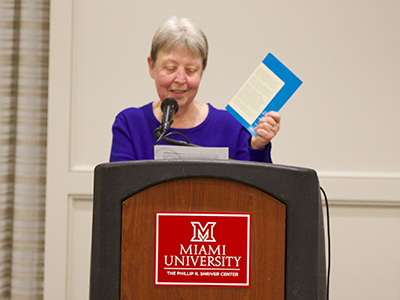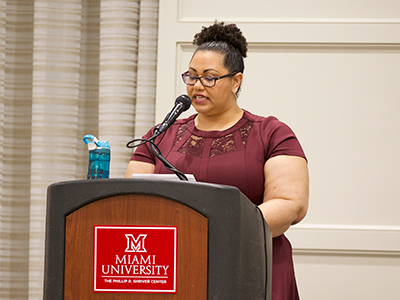Miami's annual Race, Class, Gender & Sexuality Symposium features important conversations about the influence of individual identity on contemporary society

Written by Emily Comos, CAS communications intern

Dr. Ann Fuehrer introduces the keynote speaker.
On February 22, the Women's, Gender and Sexuality Studies Program hosted its 17th annual Race, Class, Gender, and Sexuality (RCGS) Symposium, an all-day event with paper presentations, panels, roundtable discussions, and performances at Miami University's Shriver Center in Oxford.
The theme of this year's symposium was "Scholarship, Creative Work, and Activism for Social Justice.: It was headlined by keynote speaker Dr. Sami Schalk (Miami, 2008), assistant professor of gender and women's studies at University of Wisconsin-Madison.
In her talk, Schalk extolled the power of Black women's speculative fiction to interrogate current constructions of race, gender and ability, and to promote positive models of Black women's agency. Throughout the day, panelists facilitated important conversations surrounding identity, specifically race, class, gender and sexuality, both on Miami's campus and in the broader society.

Keynote speaker Dr. Sami Schalk
"Our RCGS Symposium has always been meant to emphasize and showcase the idea of students and faculty working together with the combination of research and scholarship, as aside from our guest speaker most of the presenters are from Miami University," said Ann Fuehrer, associate professor of global and intercultural studies and coordinator of Women's, Gender and Sexuality Studies.
As a representative session, the symposium's Evolving Discussions Panel, held in the morning, featured a group of Miami faculty and staff, as well as alumni, including Kyle Ashlee, Ron Becker, Jane Goettsch, Megan Kuykendoll, Michael Loeffelman, Matthew Holder, and Karen Meyers. The panelists engaged in an evolving discussion on the topic of "College Men and (Toxic) Masculinities."
The panelists began by differentiating between toxic masculinity and toxic behavior, two terms they claimed are often confused.
"Masculinity is simply part of one's identity, and it does not exist toxically on its own," said Becker. "Contrary to popular belief, masculinity can be a healthy and positive thing when it's not being weighed down by its negative connotations."
"The media has a way of latching onto buzzwords, toxic masculinity being one of them, and there is a heavier emphasis placed on the term due to recent fraternity hazing/sexual assault cases in the news," added Loeffelman, who is an academic advisor in the College of Arts and Science.
The panelists agreed that the language we use when describing these incidents is important. They also discussed ways in which the term "toxic masculinity" can be both beneficial and harmful.
"The term attempts to hold men accountable for their toxic behavior," said Ashlee. "It also helps us get on the side of gender equity to rally around a certain idea. It basically gives us a bad guy to fight against."
Jane Goettsch, who as director of the Miami University Women*s Center has spent a significant amount of time researching student development, made some recommendations for supplementary material on programming and increasing healthy masculinity on campus, including "Exploring the Complexities of Men as Allies in Feminist Movements" by Chris Linder and Rachel Johnson.
Another panel, Diverse Representations, took place at 1 pm and covered a range of topics, such as "Societal Ideals of Masculinity," "Dishonored Badasses," "Male Victimization," and "Mourning AIDS through Music." The presenters included Katie Freeman, Danielle Hart, Matt Jones, and Jayne Stone.
Freeman, an individualized studies and psychology major, gave a talk called "Stereotype Threat and Task Performance: How Calvin Klein Models Affect the Average Joe." She explained that she has been exploring the impact that stereotypes and societal ideals of masculinity have on a male individual in today's world.
"I've analyzed multiple different advertisements and interviewed many males in order to draw a conclusion based on the relationship between advertising and self confidence or lack thereof," she said.
Fuehrer has already begun to plan the 18th Race, Class, Gender and Sexuality Symposium, to take place in March 2020. The theme of the symposium will again be intersectional analyses through scholarly, creative, and activist work on individual efforts and political movements relevant to political involvement, voting rights, and the promotion of democracy for social justice.

